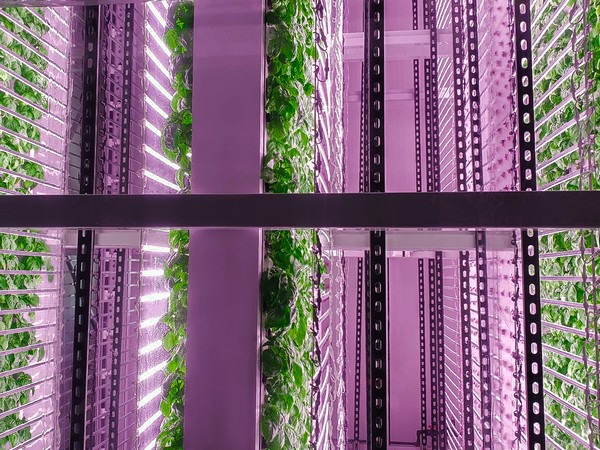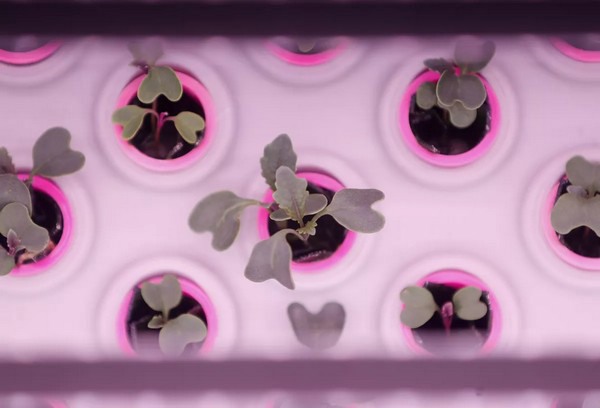OnePointOne (OPO) recently announced its partnership with Sakata Seeds to develop seeds for vertical farms. When being asked about the initial reason for the partnership, Sam Bertram, CEO and Co-Founder of OPO says, “Sakata is a world leader in hybrid and open-pollinated seeds for leafy greens and vegetables, with decades of research, IP on varieties and access to new crops in development from around the world”.
Sam explains that putting these seeds through OPO’s vertical plane aeroponic system will push the quality and productivity limits of some of the highest quality seeds on earth. “OPO’s high-resolution and hyperspectral imaging capabilities will arm our plant scientists with new data sets to further push the boundaries of what’s possible. Sakata’s executive team see tremendous value in this space and are quickly becoming leaders in the CEA seed space,” Sam affirms.
OPO’s ability to reactivate varieties in Sakata’s seed bank is of great strategic interest to both parties. In the end, a business deal depends on great people doing great work. OPO has found working with Sakata to be positive and rewarding. The tremendous synergies in strategic outcomes and company culture have made this deal powerful.

Samuel Bertram
Sakata partnership
“Our intent behind this deal is to screen Sakata’s immense seed bank to find the most nutritious, best tasting, and most productive varieties. The most important outcome is to uncover these high-performance seeds and ensure that they are distributed to the entire vertical farming marketplace,” Sam states.
This partnership will ensure that high-quality, biodiverse products are available to more people, sooner. Some varieties like Savannah grow in limited locales outside, but exceptionally well inside; creating new opportunities for “lost varieties”. According to Sam, it will drive differentiation between outdoor and indoor products in the market, making it simpler for consumers to identify indoor-grown products. “Now that we have eliminated all pesticides and contaminants, many old and new cultivars become viable for the market. In the end, the consumer will win.”
Portfolio expansion
“As we have barely scratched the surface,” Sam says, “this is a new paradigm of cultivation that just achieved its Kittyhawk flight.” He continues, “we are just at the beginning of understanding plants in these environments.” Imagine the breadth of work to be done when surveying the 30,000 varieties of edible plants, 29,800 of which are not generally found on the market. The opportunity is vast, and the future is bright. “OnePointOne is exceptionally well suited to support the needs of seed research, climate modeling and novel seed breeding for data collection or production at scale.”

According to Sam, plants are the basis of human health. OPO’s mission is to unleash the power of plants on human health. Moreover, consumer interest in a variety of tastes and flavors is no surprise, nor should it come at the cost of global sustainability. “Right now, consumers are fed the illusion of choice, but are beholden to a supply chain that makes the choice for them.” He continues, “providing new environments for the development and production of sustainable produce should be seen as an integral piece of the food supply chain.”
Difficulties
Seeds bred for outdoor settings are bred for climate and supply-chain hardiness. Sam says, “When you control the environment and eliminate the supply chain, your breeding objectives change. Therefore, the seedbanks we are drawing from have not been built for vertical farms.” According to him, breeding indoors is a far simpler and faster exercise than breeding outdoors, especially if the process and data analytics are automated. As Sam likes to put it, “Some plants just grow exceptionally better in controlled conditions.” They open new opportunities to change the flavor or biofortify nutrients just by changing the precision environment it is grown in.
As Sam explains, there’s currently no difference between vertical farming and greenhouse seeds. “In the future, there will be. Numerous early-stage organizations are dedicated to developing seeds for indoor vertical farms. Since we have tighter control over temperature, humidity, and illumination than greenhouses, we can work with the most delicate seeds and provide the precise environment they need to thrive.”

Demand
Sam sees demand coming from consumers that have been disillusioned with the false narrative of “Organic”. Consumers that know Organic cultivation practices still use pesticides and result in products laden with heavy metals. Next to that, demand comes from consumers that are willing to pay a premium for the guarantee of safety and consistent quality.
“I hope to see a greater number of people having access to higher quality, safer, pesticide-free, tasty fruits and vegetables with a much greater choice and control. This is only the beginning of the proliferation of vertical farming,” Sam notes.
Potential partnerships
“Rijk Zwaan is another great seed company,” Sam notes, “which we hope to work with to better understand how their seed libraries and crop IP could support indoor farmers with new products.” Seed breeding is a decade-long endeavor in almost every case. Being able to reproduce and vary environmental factors on demand means a dramatically faster breeding program is possible.
Currently, OPO is developing a production system that doubles as a high-throughput phenotyping system. This volume and quality of (especially imagery) data will allow AI to discover things humans cannot possibly discover. This is a clear, key differentiator.
 For more information:
For more information:
OnePointOne
info@onepointone.com
www.onepointone.com

